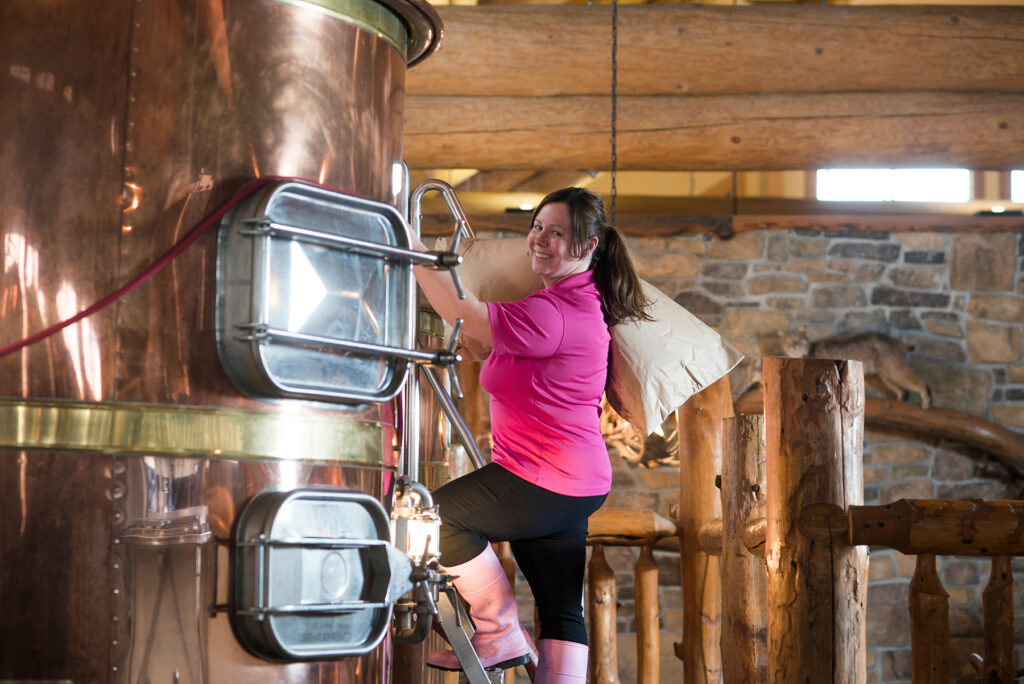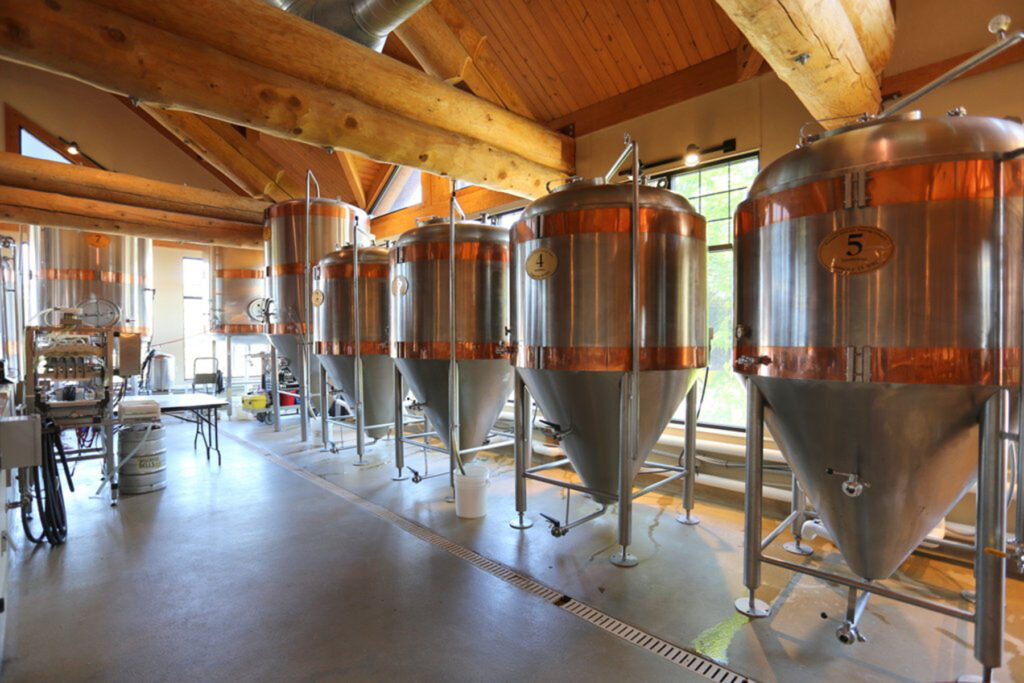When you think of beer, what comes to mind? Maybe a group of dads sharing a keg at a tailgate, or a bachelor party shotgunning cans in the back of a truck. Either way, you’re probably not imagining any women.
These stereotypes that ignore womens’ participation and contributions in beer culture leave many women in the beer industry baffled.
“If you go back to medieval times, it was the women who made the daily ale, like when they made the daily bread,” says Jamie Baertsch, the brewmaster at Wisconsin Dells Brewing Co. in the Wisconsin Dells. “It was women’s work.”
Throughout much of human history, women have been active brewers and consumers of beer. In mainland Europe the job was often undertaken by both monks and nuns, such as 12th-century Abbess Hildegard von Bingen, who authored the first surviving writings on the use of hops in beer.
Baertsch, who became Wisconsin’s first woman brewmaster in 2005, says the industrial revolution erased women from the brewing process.
“Having the technology and capability to make such large batches of beer made it really come out of the household,” she says. “No woman could move barrels that big.”
Now that she is forklift certified, Baertsch has absolutely no trouble moving massive quantities of beer around.
“When I first got into beer it was a very uncomfortable industry for women to be a part of. I started in the industry in the middle of this mindset of ‘women don’t drink beer.’”
Beer is a large part of Wisconsin culture, and the state is known for being the birthplace of Miller and Pabst. But the Wisconsin beer industry has been dominated by men since the beginning. Despite being largely overlooked in the industry as both producers and consumers, these women brewers in Wisconsin are driven by their passion for beer, shaping a new narrative and creating opportunities for others to follow.
In 2021, nearly a quarter of brewers in the U.S. were women, and only about 3% of breweries were completely woman-owned, according to a report from the Brewers Association, an organization representing craft brewers. The report says 41.4% of American breweries had at least one female owner that year. The report also says 28.3% of American breweries have a 50/50 gender split, and that those breweries were usually owned by married couples.
In Wisconsin one of these breweries is New Glarus Brewing Company, which produces the iconic local beer Spotted Cow. Deborah Carey became one of the first women to found and operate a brewery in the U.S. in the early ’90s when she raised the funds to open the brewery as a gift to her husband, brewmaster Daniel Carey. The two still operate the brewery side by side.
Community within beer industry
The field is still heavily male-dominated, says freelance beverage writer and hospitality professional Katie Herrera, who writes about beer for the Wisconsin State Journal.
“It was a very uncomfortable industry for women to be a part of,” she says. “I started in the industry in the middle of this mindset of ‘women don’t drink beer.’”
Baertsch and Erica DeAnda, the brewmaster at Tumbled Rock Brewery & Kitchen in Baraboo, which is about 40 miles north of Madison, both say being the only woman in the brewing room has occasionally been lonely.
“I’ve always felt, for the most part, supported by the men that I’ve surrounded myself with,” DeAnda says. “But there’s also an element where sometimes you want to talk to somebody who has had a similar experience that you have had in life.”
It was this lack of a female support network within brewing that led Jamie Baertsch to become an original member of the Pink Boots Society. She joined alongside her friend, brewmaster Teri Fahrendorf, who founded the organization in 2007 after a road trip across the country to meet with other woman brewers.
During her trip, the two met up in the Dells at Baertsch’s brewery in 2006.
The Pink Boots Society’s name was inspired by a pair of pink boots Fahrendorf wore on her cross-country adventure. When she stopped in the Dells, she and Baertsch realized they were twinning.
“I always had pink rubber boots, and she showed up wearing pink boots,” Baertsch says. “We took a picture like that famous picture with the farmer and his wife with the hoe.”
The Pink Boots Society is an international organization that provides women and nonbinary brewers with networking opportunities, support and brewing education. According to its website, the society aims to “assist, inspire and encourage women and nonbinary people in the fermented/alcoholic beverage industry to advance their careers through education.”

It offers seminars on different aspects of brewing like yeast management and hop usage. Since its founding, it has opened up membership to women and nonbinary people who produce all kinds of fermented beverages, including wine, cider, liquor and kombucha. It also offers scholarships for women and nonbinary people to study fermented beverage making.
DeAnda, who is also a member of the society and serves on its diversity, equity and inclusion committee, has received two scholarships from the society.
She says the society has supported her during her brewing journey.
“I was seen as being too emotional, because I wear my heart on my sleeve, and I can cry easily, and if I get frustrated, that shows, and men show it in a different way,” she says. “It’s easier for me to reach out to my network of women that I’ve met through the pink boots and say, ‘Hey, I’m feeling really frustrated. Can I talk to you about this problem that I’m having in the brew house?’”
“Sometimes it’s just easier to go to somebody who’s had a similar life experience that you’ve had, and it just makes you feel more comfortable.”
Wisconsin Beer
Wisconsin’s beer culture is influenced mostly by the German immigrants of its past who brought brewing to the state. Lagers, pilsners and refreshing beers with lower hop contents are historically preferred. The beer culture in Wisconsin remains strong, with six breweries per 100,000 adults of legal drinking age in 2023 and 5.4 gallons consumed per adult per year, according to the Brewers Association.
Emily Harrison, a senior beverage developer at Molson Coors in Milwaukee and a UW–Madison graduate, says her connection to beer was born in her Wisconsin home.
“Really around the house was just beer, and that’s what our family drank,” she says.
DeAnda, who used to work at a craft taproom in California, says she appreciates the stable relationship Wisconsinites have with their beer. Part of her training was at an English-style brewpub, and she says those traditional beer styles are more similar to Wisconsin’s favorite brews.
“In California, people were just constantly chasing after trends. And in Wisconsin, it’s more old school, and they’re looking for more true-to-style beers,” DeAnda says.
For more than a century, the Wisconsin beer industry was dominated by large breweries. The craft beer revolution has brought several interesting styles to the state since the 1990s, with microbreweries stocking grocery store shelves with porters, sours, IPAs and witbiers.

Even with this massive cultural shift, the industry largely excluded women, but many were still able to get a foot in the door.
Where Harrison works in the corporate world, much of the staff and most of the leadership is made up of men, she says. When she used to work in brewing, there were very few women on shift. She echoes DeAnda’s concerns about not being taken as seriously as men in the industry.
“I feel disappointed. I wish I had more role models at our own company,” she says. “And I guess there’s this bias in people. When you have a room full of people here, and we’re going to address a technical issue, it just seems like the men get a little more. It just doesn’t seem like we’re taken as seriously in general.”
Corrine Georges, a brewer at American Family Field in Milwaukee, where the Milwaukee Brewers play, says although she hasn’t experienced much gender discrimination through her work, that’s not the case for everyone.
Georges is the pilot brewer for J. Linenkugel’s Barrel Yard, which is the field’s restaurant and taproom. Her job involves developing and producing new beers sold at Brewers games.
“Luckily, I haven’t faced too much discrimination, like blatantly to my face,” she says. “I haven’t had to deal with anything too uncomfortable in my work life, which is nice.”
Georges says she believes a diverse beer production force creates more interesting beers.
“The more diversity, the more perspectives we can have, the better products we can get overall,” she says.
Women’s interests in beer
DeAnda, Baertsch and Herrera all say stereotypes that women prefer lighter beers, seltzers, cocktails and hard ciders to lagers and IPAs are just that: stereotypes.
“I go to a beer fest, and it’s hilarious, just the breaking of stereotypes, because I’ll have my strawberry lemon ale, and it’s always the big, burliest, toughest looking guys that are lined up for that,” Baertsch says, adding that when there’s imperial stout aged in bourbon barrels, or an imperial IPA with a high alcohol and hop content, “every little girl’s lined up for it.”
Herrera says the masculine associations with beer inhibits men’s ability to enjoy beer as well. She once worked at a taproom that served beer in wine glasses, as is common with European beers, and says many of the taproom’s male patrons would ask for their pours in a “less girly glass.”
Baertsch says although the industry and consumer base are still heavily male-dominated, she mostly feels supported by her male colleagues. When she was operating Wisconsin Dells Brewing Co. by herself, she would often call up other brewers around the state and ask for help if she was having trouble.
“I built a relationship with these guys,” she says. “The beer industry, it’s like 99.7% asshole free.”
As for the original pair of pink boots that started it all, Baertsch says those wore out long ago. However, the Pink Boots Society sold actual pink work boots for a period of time, and she had a pair.
In 2017, those boots were transferred over to the Wisconsin Historical Museum.
“Because I’m historically significant, apparently,” she laughs. “I was really happy to send them, that was pretty fun.”
Cover photo and tile photo: Moosejaw’s brew kettles at Wisconsin Dells Brewing. Photo courtesy of Moosejaw Pizza and Wisconsin Dells Brewing Co.
Published on Dec. 9, 2024